Should I Use a Proxy Server at Home? [Pros and Cons]
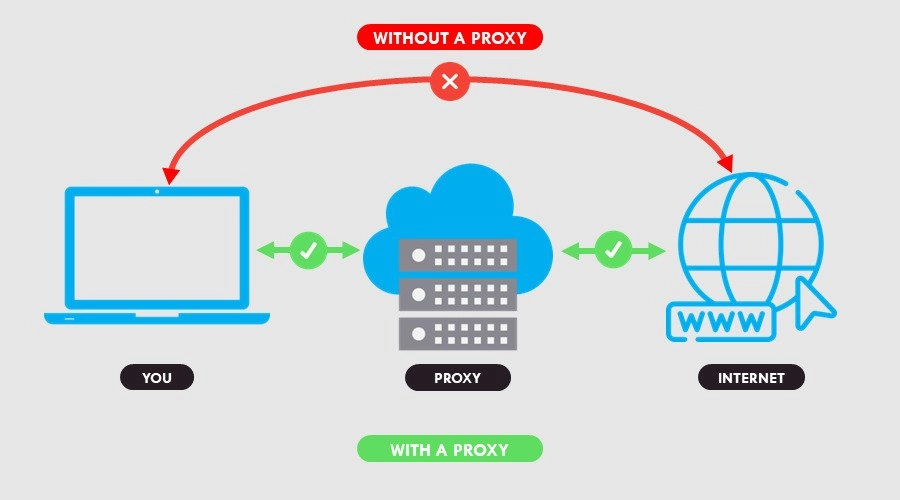
The internet is increasingly becoming more and more unsafe. Websites, apps, and search engines constantly monitor and collect data about your activities.
You’re probably aware of it. And that’s why you’re wondering: Should I use a proxy server at home?
The service promises to keep your browsing secure from prying eyes. However, it has its fair share of drawbacks to consider.
So, today we’ll show you how proxy servers work, the pros and cons, and when to use one.
Moreover, we’ll throw in a handy guide to help you choose a suitable service.
Ready? Let’s get down to business.
What is a proxy server and how does it work?
A proxy server acts as an intermediary between you and the internet. It handles all your requests to and from web apps. As such, it helps conceal your identity for enhanced security and privacy.

The two core functions that make this possible start with IP swapping. It spoofs your ISP-assigned address with that of the proxy to hide your real location.
The next implementation is encryption, which scrambles your traffic to prevent eavesdropping. However, only a few vendors include this extra layer of protection.
There are different types of proxy servers. And knowing more about them can help you pick the most suitable option.
Here’s a quick breakdown:
- HTTP: This is a basic option for handling web requests between you and the web. It doesn’t offer any encryption, which could expose your activity to third parties.
- HTTPS: Also known as an SSL proxy, it encrypts your traffic keeping it safe from snoopers. It’s ideal for sensitive tasks like online banking and ecommerce.
- SOCKS4/5: A secure socket proxy processes your internet requests through a firewall. It relies on protocols like HTTP, HTTPS, FTP, SMTP, and POP to facilitate communications.
- Transparent: As the name suggests, it doesn’t conceal your online interactions. It’s common on public Wi-Fi networks to help administrators control user browsing behavior.
- Anonymous: Unlike the transparent option, it hides your IP to protect your identity. You can use it to bypass online censorship and geo-blocked websites. In more advanced setups, some networks also use an IGMP proxy to manage multicast traffic efficiently.
- Elite: This is a hardened version of the anonymous proxy. It conceals all information about your device, operating system, browser, location, etc.
Now to the big question:
Should you use a proxy server at home?
Using a proxy server at home comes with the benefit of enhanced privacy and security. This is useful for discouraging hackers from accessing your computer network and other connected devices.
But that’s the tip of the iceberg. The best use cases are as follows:
Protect your home network
Over 60 million households in the United States have Internet of Things (IoT) devices. These are interconnected gadgets that are in constant communication via the web.
Each second, they generate and collect sensitive data that makes them the perfect target for cybercriminals. Examples include footage from your home CCTV, biometric and location data, behavioral info, and more.
And that’s where a proxy server comes in to help.
You can configure it to isolate your home network from intruders. In doing so, it prevents any unauthorized access.
Control internet access
The web is full of valuable resources. Sadly, it also harbors harmful content, especially for your children.
The worst part is you can’t watch over your kids’ online activities all the time. But you can use a proxy server to make your life easier.
With this service, you can block access to dangerous websites. Moreover, it will shield your devices against viruses and malware infections.
Block tracking/monitoring
Internet monitoring is big business for marketers. They use it to collect data about your behavior to push targeted ads.
However, some proxy services come with ad and tracker blockers. As such, they stop online advertising for a noise-free browsing experience.
Remote desktop access
A proxy helps boost the privacy of remote desktop connections.
This is important for accessing vital company systems from the comfort of your home.
Using secure protocols like sFTP and SSL also shields your traffic against eavesdropping. That way, you’ll confidently handle critical transactions without worry.
Now to the upsides and downsides of proxy servers.
What are the benefits of using a proxy server at home?
Using a proxy server at home comes with some great perks.
Let’s break them down:
Access blocked online content
A proxy switches your IP address, which virtually changes your location. Accordingly, you can take advantage of this feature to access geo-blocked resources online.
Furthermore, it’s ideal for bypassing censorship by governments and internet service providers. If you want a simple browser-based solution, you can try a free web proxy like Proxyium to unlock restricted sites quickly without installing extra software.
Furthermore, it’s ideal for bypassing censorship by governments and internet service providers.
Improve privacy and security
As mentioned earlier, a proxy server boosts your privacy and security at home. Most commonly, it achieves that by changing your real IP to hide your location.
Other approaches include encrypting your traffic and blocking web trackers. Moreover, it’s essential to block dangerous websites that could expose you or your loved ones to harmful content. For detailed steps, see our guide on how to check proxy and firewall settings to ensure your defenses are properly configured.
Protect personal information
A proxy server does an excellent job of safeguarding you against identity theft. It secures your traffic to stop third parties from collecting your sensitive information.
Additionally, the service can prevent banking details theft when transacting online. This further reduces the chances of losing your hard-earned money to cyber criminals.
Enhance internet speeds
Part of what proxy vendors offer includes caching online resources that users access the most.
This accelerates the delivery of web services resulting in a faster browsing experience. Additionally, it saves your bandwidth due to its aggressive content compression techniques.
That said, it’s not all roses.
Proxy server cons
The idea of using a proxy server to boost your security sounds cool.
But it’s vital to understand the risks of using one before getting on board:
Compatibility issues
Proxy server caching is suitable for accelerating the delivery of web services. However, it can cause compatibility issues on platforms that serve dynamic resources.
Examples include eCommerce, social media, and news websites that frequently update content. It can cause you to view stale and outdated info without your knowledge.
Aggressive compression of resources also distorts the user interface of some sites. As a result, some platforms block access from proxies.
Limited selection of servers
Proxies, unlike VPNs, rarely offer a wide variety of server locations. This can limit your options for accessing geo-locked content.
Additionally, this impacts the quality of service you’re bound to experience. For example, connecting to far-distant network nodes may slow down speeds.
And it gets worse.
Decreased performance
Performance is sometimes a big hurdle for proxy servers. They can experience high latency, which drags content that needs fast response times.
Therefore, you may see occasional lagging and screen freezing during certain activities. These include but aren’t limited to video conferencing, VOIP calls, and CCTV streaming.
Potential for malicious activity
Some proxy providers offer free services that employ insecure protocols. Accordingly, using them exposes you to harmful activities on the web.
These include phishing, spamming, identity theft, DoS/DDoS attacks, etc. Moreover, you risk coming across malicious software like malware, viruses, and worms.
Additional costs
We recommend using premium proxy services for guaranteed privacy and security. On the downside, it will cost you extra.
Still, this shouldn’t be worrisome if you care about safeguarding your home network.
And if you ever run into connection limits, check this guide on how to fix proxy error 429 for step-by-step solutions.
How to choose a good proxy server for home use?
With so many options, choosing a good proxy service can be intimidating. However, the tips below should help you narrow down to a reliable vendor:
Consider your needs
Write down a few details on what you need to accomplish with a proxy server. Consider the different types, protocols, and anonymity levels available.
Additionally, weigh in on the upsides and downsides before deciding.
Get a reliable provider
Search for a trustworthy vendor with a good reputation. Check online reviews for complaints and positive mentions as well.
Moreover, gather additional information through independent research just to be sure.
Check proxy speeds
Ensure the provider you pick guarantees low latency and fast speeds. Take advantage of free trials and refund policy periods to run tests.
Likewise, consider a vendor with the highest number of proxy servers.
Examine the level of security and privacy
Get a service provider that offers the highest level of security and anonymity. For better privacy, look for protocols like SSL, SOCKS4/5, and elite-level coverage.
If possible, ensure the vendor doesn’t monitor your activities.
Consider the cost
Forget the fallacy that cheap is expensive. You should be able to find a good proxy service at a pocket-friendly price.
But if money isn’t an issue, feel free to get a top-shelf service, as they tend to have all the benefits with only a few of the drawbacks.
Now enough with the talk – let’s get down to business.
How to set up your proxy server?
Need platform-specific steps and screenshots? See our full guide on how to change proxy settings on Windows, macOS, Linux, Android, and iOS.
The configuration process is pretty straightforward. Just follow these simple steps:
- Search for the Network & Internet settings option on your device. In our case, we’ll use a Windows 11 PC.
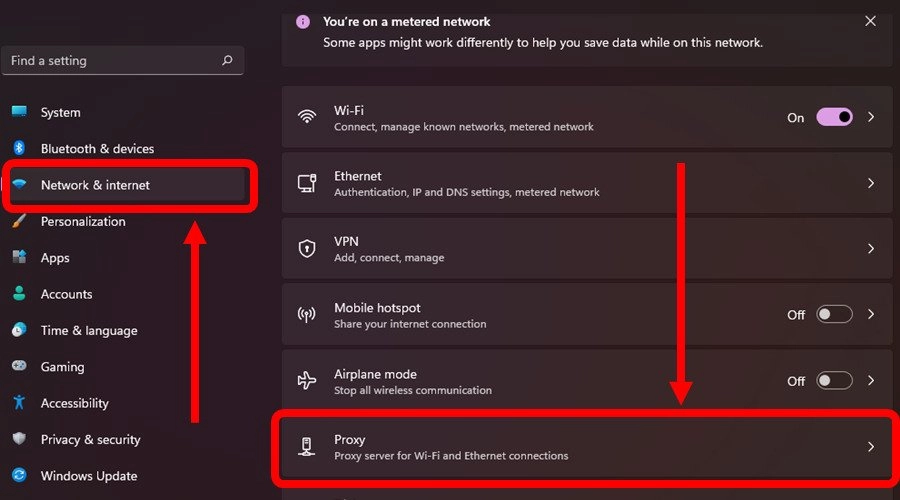
2. Locate and click on Proxy to view the configurations menu.
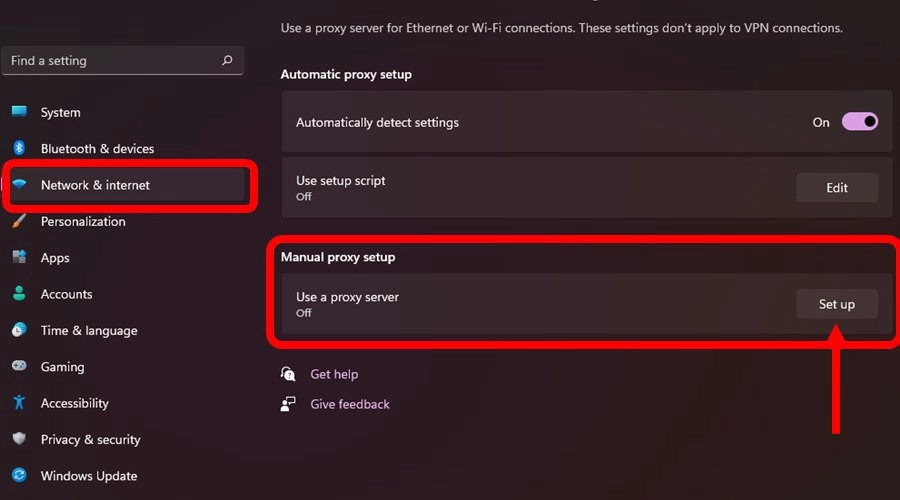
3. Choose Manual proxy setup.
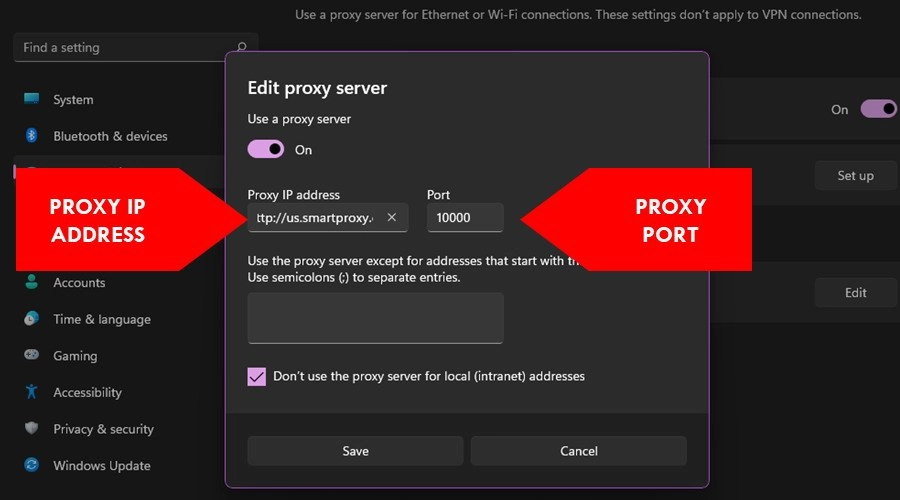
4. Toggle it On and enter your vendor’s Proxy IP address and Port number.
5. Save and connect to the internet.
The steps above will differ from one device to another. Should you get stuck, refer to the manual and manufacturer’s website for details.
Best proxy servers for home use
We understand searching for a trustworthy proxy provider is challenging. That’s why we’re not letting you go without recommending some good options.
Have a look:
- Decodo: It’s a premium provider with 195+ data centers worldwide. The vendor’s IP pool comprises 40 million shared and dedicated addresses, including residential ones. Additionally, it offers flexible pricing options and 24/7 customer support.
- Oxylabs: This is a top-notch provider with excellent global availability. It has an infrastructure in over 180 countries and an IP base of 100 million addresses. Besides that, it provides hardened security via protocols like SOCKS5 and SSL.
- HideMyAss: This is a highly secure privacy-first proxy service. It provides dedicated IPs alongside DNS leak protection. The best part? It’s available for free.

Decodo
Bypass geo-restrictions and enjoy a fast and secure connection with Decodo.Summary
So, should you use a proxy server at home? As you’ve seen, investing in one is great for enhancing your online privacy and security.
It’s ideal for blocking monitoring by ISPs and web apps that you use. Furthermore, you can use it to prevent the bad guys from snooping in your household.
Its other benefits include accessing geo-blocked content, evading censorship, and safeguarding personal data.
However, the service has downsides like compatibility issues, decreased web performance, extra costs, etc. Overall, it’s worth a shot if the benefits outweigh the drawbacks.
Read our disclosure page to find out how can you help VPNCentral sustain the editorial team Read more





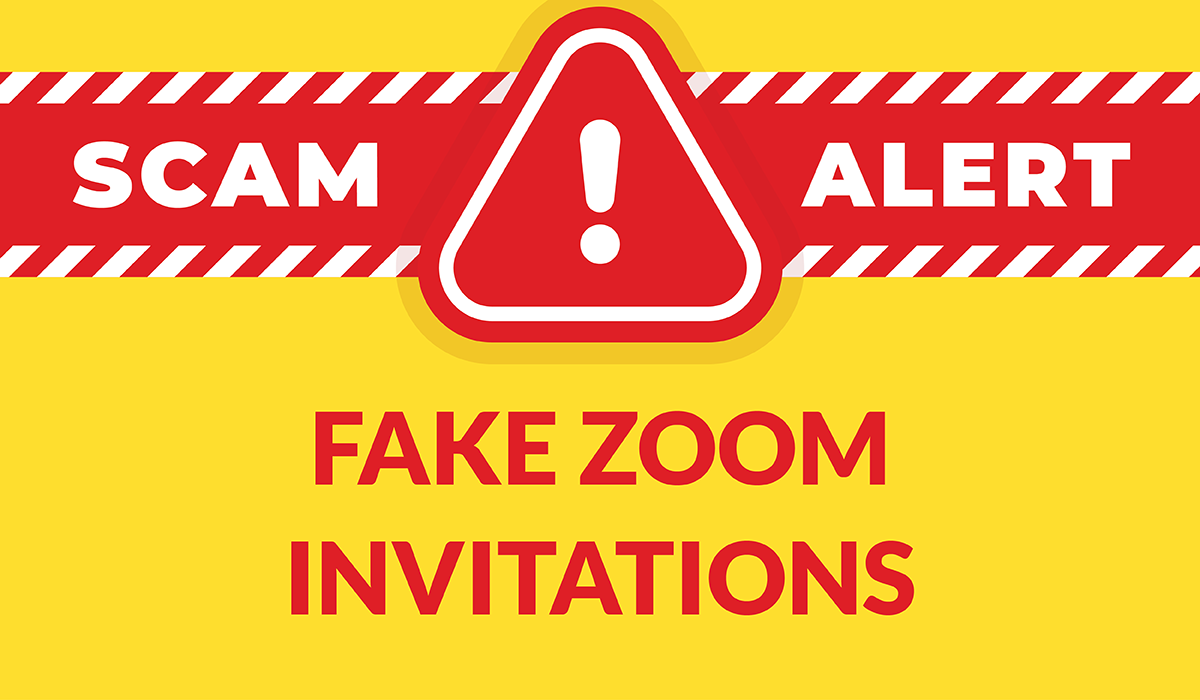
User forum
0 messages